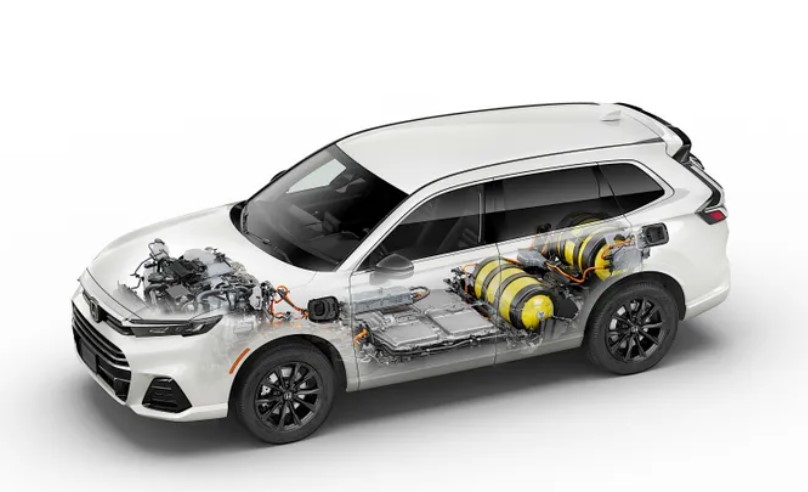Honda and GM have been working together in the field of hydrogen fuel cells since 2017 and have established a joint venture, Fuel Cell System Manufacturing LLC, to develop and produce hydrogen fuel cells. The collaboration builds on the two companies' long-standing investments and accumulation in fuel cell technology.
For now, Honda has shifted its performance manufacturing center in Marysville, Ohio, from producing the Acura NSX sports car to producing a hydrogen fuel cell version of the company's CR-V compact crossover SUV.
Honda engineers have optimized the structure and suspension of the 2025 CR-V e:FCEV for fuel cell applications. Compared to the internal combustion engine-driven CR-V, the rear lateral stiffness is increased by 10% and the rear torsional stiffness is increased by 9%, thanks to the extra strength provided by the floor-mounted battery pack.
As a new type of clean energy vehicle, plug-in hydrogen fuel cell vehicles combine hydrogen fuel cell and plug-in charging technology, which has the advantages of zero emission, high energy efficiency and long battery life. Its advent will effectively reduce vehicle exhaust emissions, reduce environmental pollution, and provide people with a greener and healthier way to travel.

Pictured: Honda starts production of hydrogen fuel cell SUVs
The plug-in hydrogen fuel cell vehicle jointly developed by Honda and General Motors has made an important breakthrough in technological innovation. First, the system uses advanced hydrogen fuel cell technology, which has higher energy conversion efficiency and lower emissions. Secondly, the vehicle is equipped with a plug-in charging function, which makes it possible to operate in areas where the hydrogen refueling infrastructure is not complete. This flexible and diverse charging method will greatly improve the range and convenience of the vehicle.
In addition, Honda and GM have also optimized and upgraded the battery system, electric motor and electronic control to further improve the performance and reliability of the vehicle. The new hydrogen fuel cell system has a longer service life and lower maintenance costs, bringing consumers a more economical and affordable travel experience.
As a new type of clean energy vehicle, plug-in hydrogen fuel cell vehicles have broad market prospects and development potential. With the increasing global awareness of environmental protection and the continuous advancement of clean energy technology, hydrogen fuel cell vehicles will become an important part of sustainable transportation in the future. Honda and General Motors will jointly launch plug-in hydrogen fuel cell vehicles to further promote the popularization and application of hydrogen fuel cell technology and make a positive contribution to environmental protection.
At the same time, with the support of policies and the growth of market demand, the hydrogen fuel cell vehicle industry chain will continue to improve and develop. From the production, storage and transportation of hydrogen to the R&D, production and sales of hydrogen fuel cells, the entire industry chain will form a huge ecosystem. As important players in the value chain, Honda and General Motors will play a key role in promoting the healthy development of the entire industry.






